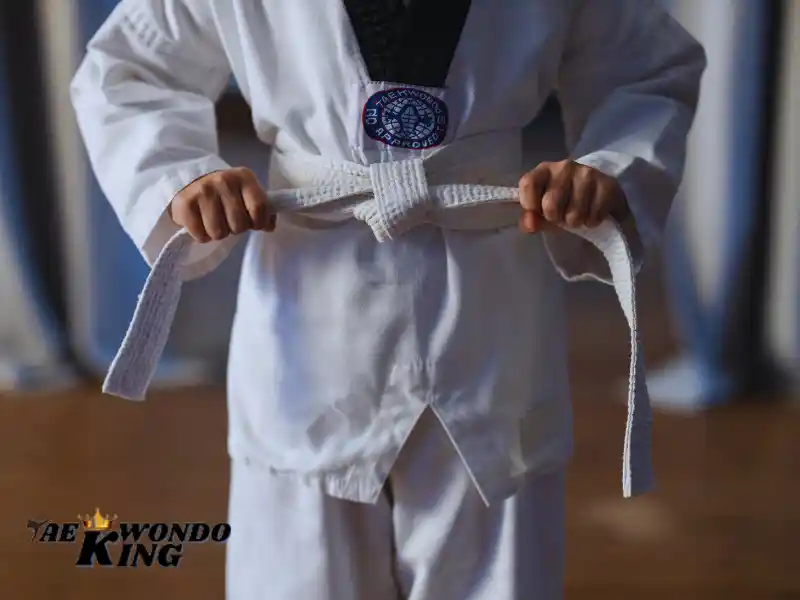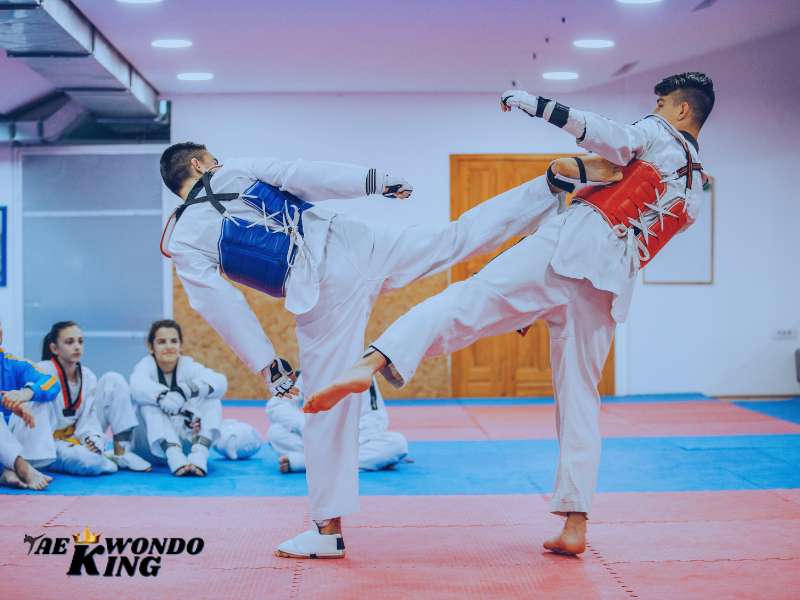
Martial arts have long been associated with discipline, self-defense, and personal growth. Many people find solace, purpose, and structure through martial arts training. But what about those who have a criminal record? Can a felon learn martial arts? The short answer is yes, but the path might have its challenges.
In this article, we’ll explore the opportunities, obstacles, and benefits for felons who wish to practice martial arts.
Check out the Adidas Taekwondo Shoes on Amazon Today!.

What Does It Mean to Be a Felon?
A felon is someone who has been convicted of a serious crime. These crimes often carry longer sentences and more significant legal consequences. After serving time, felons often face challenges in rebuilding their lives. Finding work, rejoining the community, and regaining confidence can be tough. Martial arts can help with this process by offering structure and personal improvement.
Why Would a Felon Want to Learn Martial Arts?
1. Self-Defense
Martial arts teach practical skills for self-defense. A felon may want to feel safer in their environment. Knowing how to defend oneself can boost confidence and reduce fear.
2. Fitness and Health
Staying active is important for physical and mental health. Martial arts provide a full-body workout. It improves strength, flexibility, and endurance.
3. Discipline and Focus
Martial arts require dedication. Training helps develop discipline, focus, and patience. These traits can help felons stay on the right path.
4. Mental Health Benefits
Practicing martial arts reduces stress. It helps calm the mind and promotes inner peace. For felons dealing with anxiety or guilt, martial arts can provide relief.
Challenges Felons May Face in Learning Martial Arts
While a felon can learn martial arts, there are some hurdles they may encounter.
1. Background Checks
Some martial arts schools perform background checks. They may deny admission based on a criminal record.
2. Legal Restrictions
In some cases, felons may face legal restrictions. For example, a probation agreement might limit their ability to participate in certain activities.
3. Stereotypes and Stigma
Felons often face judgment. Others may assume they are dangerous or untrustworthy. This stigma can create barriers.
4. Access to Resources
Financial limitations may make it hard for felons to pay for classes. Additionally, finding a school that welcomes them might take time.
Check out the Adidas Taekwondo Shoes on Amazon Today!.

Can a Felon Join Any Martial Arts School?
The answer depends on the school’s policies and the type of crime committed. Some schools are more lenient and focus on inclusivity. Others may have strict rules.
Before joining a school, a felon should research their options. It helps to be honest about their background. Transparency can build trust with instructors.
Martial Arts Styles Felons Can Learn
Felons can learn almost any style of martial arts. The choice depends on personal interests and goals.
1. Karate
Karate focuses on striking techniques. It’s great for self-defense and improving physical fitness.
2. Brazilian Jiu-Jitsu (BJJ)
BJJ teaches ground-fighting and grappling. It’s a practical style for self-defense and gaining confidence.
3. Taekwondo
Taekwondo emphasizes kicks and flexibility. It also promotes discipline and mental strength.
4. Muay Thai
Known as the “Art of Eight Limbs,” Muay Thai uses punches, kicks, elbows, and knees. It’s excellent for fitness and self-defense.
5. Aikido
Aikido focuses on redirecting an opponent’s energy. It’s a non-violent martial art that promotes harmony.
How Martial Arts Help Rehabilitate Felons
1. Teaching Responsibility
Martial arts require commitment. Students must show up on time and follow rules. This helps build a sense of responsibility.
2. Providing Structure
Training schedules offer structure. This is especially helpful for felons who need routine in their lives.
3. Building Confidence
Achieving martial arts goals, like earning a belt, boosts self-esteem. It reminds felons that they are capable of success.
4. Creating Community
Martial arts schools often feel like families. Students support each other and celebrate progress together.
Are There Legal Concerns for Felons Practicing Martial Arts?
In general, felons can legally practice martial arts. However, certain restrictions may apply:
Weapon Training:
Felons might not be allowed to train with weapons, like swords or nunchaku.
Probation Rules:
Some probation agreements limit physical activities.
It’s always best to consult a legal advisor before starting martial arts training.
Stories of Success: Felons Who Turned Their Lives Around with Martial Arts
Many felons have used martial arts to rebuild their lives. Here are a few inspiring examples:
Mark’s Journey
Mark served time for theft. After his release, he joined a local BJJ gym. The training gave him a sense of purpose. Today, Mark teaches self-defense classes to at-risk youth.
Sarah’s Transformation
Sarah struggled with anger issues. She started learning Karate and found peace through training. Now, she’s a black belt and mentors others who are rebuilding their lives.
Jason’s Comeback
Jason was convicted of assault. Through Aikido, he learned to channel his energy in positive ways. Martial arts helped him stay out of trouble and find a new path.
Check out the Adidas Taekwondo Shoes on Amazon Today!.

Tips for Felons Interested in Learning Martial Arts
If you’re a felon wondering how to start, follow these steps:
Research Schools
Look for schools with inclusive policies. Online reviews can provide insights.
Be Honest
If asked, be upfront about your background. Many instructors value honesty.
Start Small
Begin with beginner classes or community programs. This helps you ease into training.
Set Goals
Focus on personal growth. Whether it’s earning a belt or improving fitness, having goals keeps you motivated.
The Role of Instructors
Martial arts instructors play a key role in supporting felons. A good instructor:
- Encourages positive behavior.
- Provides mentorship.
- Helps students channel their energy constructively.
If an instructor seems judgmental or unsupportive, don’t hesitate to look for a better fit.
Felon Learn Martial Arts: Breaking Stereotypes
The idea of a felon learning martial arts might raise eyebrows. However, it’s important to break stereotypes. Felons deserve a chance to improve their lives. Martial arts can be a powerful tool for rehabilitation.
When people see a felon succeed in martial arts, it challenges assumptions. It shows that change is possible.
Martial Arts as a Tool for Reintegration
Reintegrating into society can be difficult for felons. Martial arts help by:
- Building social skills.
- Teaching respect for others.
- Providing a positive outlet for emotions.
These skills make it easier to adapt to life outside of prison.
Felon Learn Martial Arts: A Step Toward Redemption
Redemption is a journey. For felons, learning martial arts can be a meaningful step. It’s not just about self-defense or fitness. It’s about reclaiming their lives and proving they can change.
Final Thoughts
So, can a felon learn martial arts? Absolutely. The journey may not be easy, but it’s worth it. Martial arts provide tools for growth, discipline, and redemption.
Felons who embrace martial arts often find more than just a sport. They find a community, a purpose, and a path forward. If you’re a felon considering martial arts, take the first step. It could change your life.
FAQs
Trades like welding, trucking, and construction are great for felons. Tech and freelance work can also offer second chances. Learn more about your options.
A Class A felony is the most serious. It can mean life in prison or even the death penalty, depending on the crime. Learn more about felony classes.
Yes, felons can become pro boxers if they pass licensing rules in their state. Rules vary. Learn more about boxing and criminal records.
Brazilian Jiu-Jitsu is often called the hardest to learn due to its deep techniques and long mastery time. Learn more about BJJ vs other styles.
Degrees in IT, business, or the trades are solid choices. They lead to jobs where background checks may be less strict. Learn more about top degrees.
A criminal justice or law degree is best if you want to work in criminal law. Pre-law is a smart starting point. Learn more about law school paths.
Felonies happen from serious crimes like theft, assault, or drug offenses. There’s no “easy” way, and the consequences are lifelong. Learn more about avoiding mistakes.
In some cases, yes. Programs like “Ban the Box” help fair hiring. Roles may be limited. Learn more about government jobs and background checks.
Criminology grads often work in law enforcement, forensics, or social work. Some work in research. Learn more about career paths in criminology.
Check out the Adidas Taekwondo Shoes on Amazon Today!.


Founder, Owner, and CEO of TaekwondoKing.
He is one of the top 100 martial artists in the World and among the top 20 referees in Bangladesh.
Ehatasamul Alom is an esteemed Kukkiwon Certified Taekwondo 3rd Dan Black Belt with over 15 years of experience in this dynamic martial art. Born in Rajshahi, Bangladesh, Ehatasamul’s journey with Taekwondo began at the tender age of seven. His passion led him to compete at national and international levels, where he has bagged numerous awards and honors. He is also a member of the Taekwondo National Referee Panel.
With a Bachelor’s degree in Sports Science from the prestigious Rajshahi University, Ehatasamul has a deep understanding of the technical and scientific aspects of martial arts and some other martial arts.
In 2022, Ehatasamul created the “TaekwondoKing.com” to share his knowledge, Free Resources, Values, and Real experiences. His articles focus on Taekwondo training techniques, competition strategies, Sport Products Reviews, and the art’s rich history and philosophy. He also writes about the importance of mental fortitude and discipline, key aspects of his teaching philosophy. He has already launched many sports, Taekwondo, and health-related Free online tools. His goal is to inspire both beginners and seasoned practitioners worldwide through insightful and engaging content.
If you need any help, contact Ehatasamul Alom at any time.




